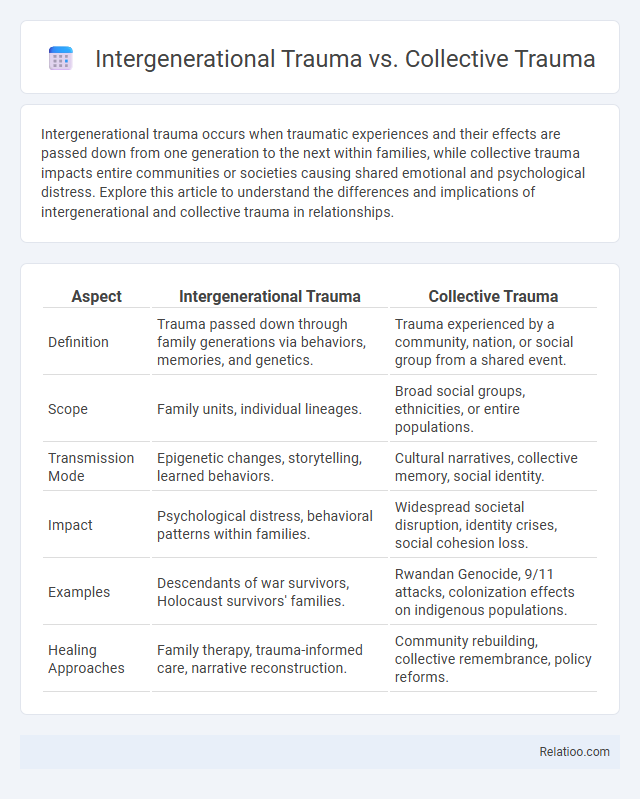Intergenerational trauma occurs when traumatic experiences and their effects are passed down from one generation to the next within families, while collective trauma impacts entire communities or societies causing shared emotional and psychological distress. Explore this article to understand the differences and implications of intergenerational and collective trauma in relationships.
Table of Comparison
| Aspect | Intergenerational Trauma | Collective Trauma |
|---|---|---|
| Definition | Trauma passed down through family generations via behaviors, memories, and genetics. | Trauma experienced by a community, nation, or social group from a shared event. |
| Scope | Family units, individual lineages. | Broad social groups, ethnicities, or entire populations. |
| Transmission Mode | Epigenetic changes, storytelling, learned behaviors. | Cultural narratives, collective memory, social identity. |
| Impact | Psychological distress, behavioral patterns within families. | Widespread societal disruption, identity crises, social cohesion loss. |
| Examples | Descendants of war survivors, Holocaust survivors' families. | Rwandan Genocide, 9/11 attacks, colonization effects on indigenous populations. |
| Healing Approaches | Family therapy, trauma-informed care, narrative reconstruction. | Community rebuilding, collective remembrance, policy reforms. |
Understanding Intergenerational Trauma
Intergenerational trauma refers to the transmission of trauma symptoms and emotional wounds from one generation to the next, often due to unresolved traumatic experiences within a family or community. It differs from collective trauma, which impacts an entire group or society following a shared catastrophic event, such as war or genocide. Understanding intergenerational trauma involves recognizing patterns of inherited behavioral, psychological, and epigenetic changes that influence descendants' mental health and social functioning.
Defining Collective Trauma
Collective trauma refers to psychological distress and damage experienced by a group or community following shared traumatic events such as wars, natural disasters, or systemic oppression. Unlike intergenerational trauma, which transmits trauma effects across family lines, collective trauma impacts societal identity and cohesion on a broader scale. Understanding collective trauma involves analyzing how communal memory, cultural narratives, and group dynamics influence healing processes and long-term social consequences.
Key Differences Between Intergenerational and Collective Trauma
Intergenerational trauma refers to the transmission of traumatic experiences and their psychological effects from one generation to the next within families, whereas collective trauma impacts entire communities or societies due to shared traumatic events such as wars or natural disasters. Your healing process may differ significantly because intergenerational trauma involves personal, familial dynamics, while collective trauma encompasses broader social and cultural dimensions. Distinguishing these key differences helps tailor interventions effectively, addressing either intimate family histories or widespread social healing.
Sources and Causes: Family vs. Community Impact
Intergenerational trauma originates primarily within families, caused by the transmission of unresolved emotional wounds, abuse, or neglect across generations. Collective trauma stems from community-wide events such as war, genocide, or natural disasters that affect large populations and disrupt social structures. While intergenerational trauma reflects intimate, familial psychological legacies, collective trauma results in widespread cultural and societal implications.
Transmission Mechanisms: Genetics, Narrative, and Culture
Intergenerational trauma is transmitted through genetic alterations, epigenetic changes, and family narratives that pass down emotional wounds across generations, while collective trauma spreads its impact through shared cultural memories, community rituals, and social structures. Genetic mechanisms influencing trauma transmission include epigenetic markers that affect stress response systems, whereas narrative transmission relies on storytelling and familial communication shaping identity and coping strategies. Cultural transmission incorporates symbols, traditions, and collective memory that reinforce group cohesion and perpetuate trauma awareness in communities affected by historical events.
Psychological and Social Consequences
Intergenerational trauma affects your psychological well-being through inherited emotional wounds, often manifesting as anxiety, depression, or PTSD across generations. Collective trauma impacts social cohesion by disrupting community trust and shared identity, leading to widespread feelings of grief and instability. Both types of trauma create complex psychological and social challenges, requiring mindful approaches to healing and resilience-building.
Healing Strategies and Interventions
Healing strategies for intergenerational trauma emphasize trauma-informed therapy, family counseling, and culturally sensitive approaches to address inherited emotional wounds passed through generations. Collective trauma interventions prioritize community-based healing, restorative justice, and public acknowledgment of shared experiences to rebuild social cohesion and collective identity. Combining these approaches, effective healing integrates individual therapy with community healing practices, fostering resilience and breaking cycles of trauma across both personal and societal levels.
Case Studies: Real-World Examples
Case studies reveal distinct patterns between intergenerational trauma, collective trauma, and transgenerational trauma through real-world examples such as the Holocaust survivors' descendants, Indigenous communities affected by colonization, and families impacted by systemic racism. Research in these cases highlights how trauma is transmitted biologically, socially, and culturally, influencing mental health and identity across generations. Your understanding deepens when examining these specific examples that demonstrate how trauma shapes societies and individual lives over time.
The Role of Resilience and Recovery
Resilience plays a crucial role in mitigating the impacts of intergenerational and collective trauma by enabling individuals and communities to adapt and recover despite the transmission of trauma across generations or shared experiences. Your ability to foster resilience through supportive environments, mental health resources, and cultural continuity can significantly influence recovery outcomes. Understanding the distinct mechanisms of trauma transmission and promoting healing strategies tailored to both intergenerational and collective trauma enhances long-term recovery and community well-being.
Moving Forward: Prevention and Awareness
Intergenerational trauma, collective trauma, and historical trauma all require targeted prevention strategies emphasizing education, community support, and resilience-building to mitigate long-term psychological and social effects. Public awareness campaigns, culturally sensitive therapeutic interventions, and inclusive policy development promote healing by addressing root causes and fostering environments that prevent trauma transmission across generations. Empowering affected communities with resources and knowledge serves as a crucial step toward breaking trauma cycles and cultivating sustainable recovery.

Infographic: Intergenerational Trauma vs Collective Trauma
 relatioo.com
relatioo.com